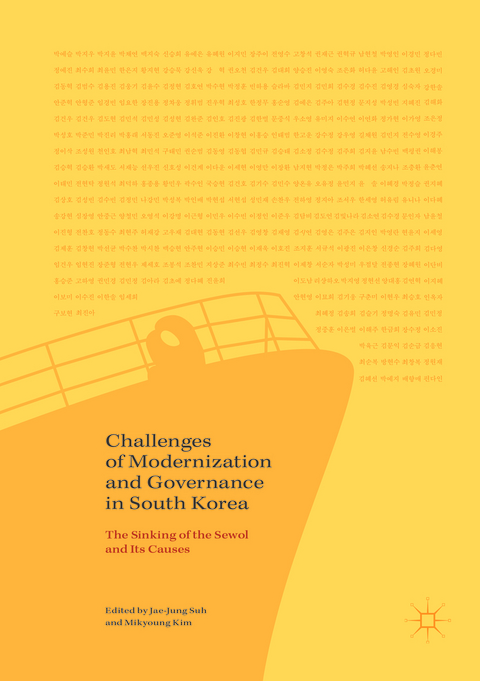
Challenges of Modernization and Governance in South Korea
Springer Verlag, Singapore
978-981-13-5027-6 (ISBN)
Jae-Jung Suh is Professor at the International Christian University in Tokyo, Japan. He has served as Associate Professor and Director of Korea Studies at SAIS, Johns Hopkins University and Assistant Professor in Department of Government at Cornell University as well as on the Presidential Commission on Policy Planning (Republic of Korea). Mikyoung Kim is International PoliticalScience Association (IPSA) Chair of Human Rights Research Committee. She has published many refereed articles and book chapters on memory, reconciliation, and human rights in East Asia. She was a two-term member of ROK National Unification Advisory Council (2012-15).
Introduction: Sinking the Sewol, Drowning Korea? Compressed Modernization and Compounded Risks.- The Sewol Disaster: Predictable Consequences of Neoliberal Deregulation.- Institutionalized Irresponsibility: Understanding the Sewol Disaster from the Perspective of the Addictive Organization Theory.- National Crisis and Democratic Consolidation in South Korea.- Capturing Collusion: The Industry and the Government in Ferry Safety Regulation.- “Stay Still”: Sewol, a Tale of Fatal Censorship, Fatal Paternalism.- Disciplining High School Students and Molding Their Subjectivity in South Korea: a Shift in Disciplinary Paradigm.- Foreign to Disaster or New Point of Solidarity? A Vietnamese Victim Family in the Sewol Aftermaths.- From Passive Citizens to Resistant Subjects: The Sewol Families Stand Up to the State.- Epilogue: The Wreck of the Sewol.
| Erscheinungsdatum | 04.03.2022 |
|---|---|
| Zusatzinfo | 5 Illustrations, black and white; XVII, 227 p. 5 illus. |
| Verlagsort | Singapore |
| Sprache | englisch |
| Maße | 148 x 210 mm |
| Themenwelt | Naturwissenschaften ► Biologie ► Ökologie / Naturschutz |
| Naturwissenschaften ► Geowissenschaften | |
| Sozialwissenschaften ► Soziologie | |
| Wirtschaft ► Volkswirtschaftslehre | |
| Schlagworte | Civil Society in Asia • Crisis and the Sewol incident • Development Economics • Disaster Management and Governance • Environmental Sociology in South Korea |
| ISBN-10 | 981-13-5027-2 / 9811350272 |
| ISBN-13 | 978-981-13-5027-6 / 9789811350276 |
| Zustand | Neuware |
| Informationen gemäß Produktsicherheitsverordnung (GPSR) | |
| Haben Sie eine Frage zum Produkt? |
aus dem Bereich


